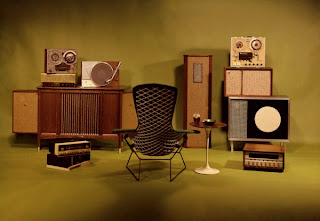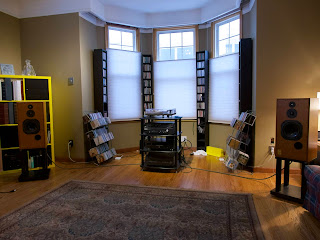Am I Digital or Am I Analogue?
I remember near the end of high school the use of digital music playing equipment was just beginning. The CD player had been introduced. It was a kind of miracle. Though you might hear people wax about the wonders of vinyl it is true that vinyl had its shortcomings.
Compact cassettes, reel-to-reel and records all had in common a system for modulating sound either with a magnetic impulse or a physical variance in the terrain. Not long ago I showed the grandchild of a parishioner my turntable and I put a record on it. As we listened to the music I heard myself saying, " . . . and there are no computers being used to make this sound." Wow! You can actually see the bumps on the record and the tiny little needle at the end of the tonearm that follows those bumps.
Television sets use pixels as do our computer monitors. If you put enough of them together they appear to present a smooth image. The same is true in movies. A series of still photos moved in sequence at a sufficiently fast rate will appear to our eyes as smooth action.
We are really both analogue and digital. We don't think pixelated thoughts or make pixelated movements with our arms. A good athlete is smooth. But we do know that at the deepest level of human life that we have yet observed there is a mathematical order that can be described. We call it the human genome. I remember in high school too, talking about the nature of light. Is it a wave? Or a particle? A wave is kind of analogue and a particle is pretty "digital". This duality touches the whole range of quantum mechanics in physics.
 What we lived with in listening to our records was hiss and then quite a few pops. You couldn't make the sound very portable either. We listened to AM radio. Talk about poor fidelity! 8-track tapes came along in the early '70's and then compact cassettes and players were available in cars. The Sony Walkman came along, joining the small transistor radio as a means of portable personal music. Sound systems moved from furniture-like cabinets to separate components. Teenage males really liked to be able to boast that they had their own sound system.
What we lived with in listening to our records was hiss and then quite a few pops. You couldn't make the sound very portable either. We listened to AM radio. Talk about poor fidelity! 8-track tapes came along in the early '70's and then compact cassettes and players were available in cars. The Sony Walkman came along, joining the small transistor radio as a means of portable personal music. Sound systems moved from furniture-like cabinets to separate components. Teenage males really liked to be able to boast that they had their own sound system.
The CD took all this portability and improving fidelity brought it a big leap forward. For the first time you could have a really good clean sound without spending gobs of money a big sound system. CD's were also easy to care for and transport around relative to records. Faithful recordings were often made onto compact cassettes to produce dance mixes and so on for parties at home.
As a I began to listen more to classical music in my university and seminary years I really looked forward to the clarity and the complete lack of hiss that CD's afforded. Another big benefit is that they were up to 80 minutes long. At last a whole symphony or act of an opera could be listened to without interruption. In fact, the length of classical tracks seems to be the subject of marketing confusion in the download world of today as they are so much longer than the tracks of popular forms of music.
 Classical and jazz music labels realized the sales potential they had in reissuing older recordings with the new clarity of digital technology. Purely digital recordings were exciting because of their new levels of dynamic range. As time went on some voices suggested that CD's sounded a bit strident and that the old vinyl had warmth that was lacking in the new digital technology. Some people today still choose to have amplifiers that use tubes for this reason. There are sonic limits to the root digital protocol called "PCM", but I'm guessing that unless you've got really superior equipment including your ears, that these things are really a matter of taste.
Classical and jazz music labels realized the sales potential they had in reissuing older recordings with the new clarity of digital technology. Purely digital recordings were exciting because of their new levels of dynamic range. As time went on some voices suggested that CD's sounded a bit strident and that the old vinyl had warmth that was lacking in the new digital technology. Some people today still choose to have amplifiers that use tubes for this reason. There are sonic limits to the root digital protocol called "PCM", but I'm guessing that unless you've got really superior equipment including your ears, that these things are really a matter of taste.
There is a resurgence in vinyl and in the sales of turntables that may have started with DJ's, but now extends to a wide variety of musical genres. The new vinyl records are expensive. I haven't forked out the money yet. I think the best reason to have a turntable is to troll old records. It takes some effort to hear the vitality of old recordings played on a scratchy record, but sometimes it is well worth the effort.
The opportunity that digital technology provides is the way one can seamlessly manipulate recordings. The virtue that analogue methods present is that they are less mediated than their digital counterparts. For music, at least, the goal should be a direct connection between the person making the music and the listener. How does the sound engineer figure? Gently, I hope.
Compact cassettes, reel-to-reel and records all had in common a system for modulating sound either with a magnetic impulse or a physical variance in the terrain. Not long ago I showed the grandchild of a parishioner my turntable and I put a record on it. As we listened to the music I heard myself saying, " . . . and there are no computers being used to make this sound." Wow! You can actually see the bumps on the record and the tiny little needle at the end of the tonearm that follows those bumps.
Television sets use pixels as do our computer monitors. If you put enough of them together they appear to present a smooth image. The same is true in movies. A series of still photos moved in sequence at a sufficiently fast rate will appear to our eyes as smooth action.
We are really both analogue and digital. We don't think pixelated thoughts or make pixelated movements with our arms. A good athlete is smooth. But we do know that at the deepest level of human life that we have yet observed there is a mathematical order that can be described. We call it the human genome. I remember in high school too, talking about the nature of light. Is it a wave? Or a particle? A wave is kind of analogue and a particle is pretty "digital". This duality touches the whole range of quantum mechanics in physics.
 What we lived with in listening to our records was hiss and then quite a few pops. You couldn't make the sound very portable either. We listened to AM radio. Talk about poor fidelity! 8-track tapes came along in the early '70's and then compact cassettes and players were available in cars. The Sony Walkman came along, joining the small transistor radio as a means of portable personal music. Sound systems moved from furniture-like cabinets to separate components. Teenage males really liked to be able to boast that they had their own sound system.
What we lived with in listening to our records was hiss and then quite a few pops. You couldn't make the sound very portable either. We listened to AM radio. Talk about poor fidelity! 8-track tapes came along in the early '70's and then compact cassettes and players were available in cars. The Sony Walkman came along, joining the small transistor radio as a means of portable personal music. Sound systems moved from furniture-like cabinets to separate components. Teenage males really liked to be able to boast that they had their own sound system.The CD took all this portability and improving fidelity brought it a big leap forward. For the first time you could have a really good clean sound without spending gobs of money a big sound system. CD's were also easy to care for and transport around relative to records. Faithful recordings were often made onto compact cassettes to produce dance mixes and so on for parties at home.
As a I began to listen more to classical music in my university and seminary years I really looked forward to the clarity and the complete lack of hiss that CD's afforded. Another big benefit is that they were up to 80 minutes long. At last a whole symphony or act of an opera could be listened to without interruption. In fact, the length of classical tracks seems to be the subject of marketing confusion in the download world of today as they are so much longer than the tracks of popular forms of music.
 Classical and jazz music labels realized the sales potential they had in reissuing older recordings with the new clarity of digital technology. Purely digital recordings were exciting because of their new levels of dynamic range. As time went on some voices suggested that CD's sounded a bit strident and that the old vinyl had warmth that was lacking in the new digital technology. Some people today still choose to have amplifiers that use tubes for this reason. There are sonic limits to the root digital protocol called "PCM", but I'm guessing that unless you've got really superior equipment including your ears, that these things are really a matter of taste.
Classical and jazz music labels realized the sales potential they had in reissuing older recordings with the new clarity of digital technology. Purely digital recordings were exciting because of their new levels of dynamic range. As time went on some voices suggested that CD's sounded a bit strident and that the old vinyl had warmth that was lacking in the new digital technology. Some people today still choose to have amplifiers that use tubes for this reason. There are sonic limits to the root digital protocol called "PCM", but I'm guessing that unless you've got really superior equipment including your ears, that these things are really a matter of taste.There is a resurgence in vinyl and in the sales of turntables that may have started with DJ's, but now extends to a wide variety of musical genres. The new vinyl records are expensive. I haven't forked out the money yet. I think the best reason to have a turntable is to troll old records. It takes some effort to hear the vitality of old recordings played on a scratchy record, but sometimes it is well worth the effort.
The opportunity that digital technology provides is the way one can seamlessly manipulate recordings. The virtue that analogue methods present is that they are less mediated than their digital counterparts. For music, at least, the goal should be a direct connection between the person making the music and the listener. How does the sound engineer figure? Gently, I hope.


